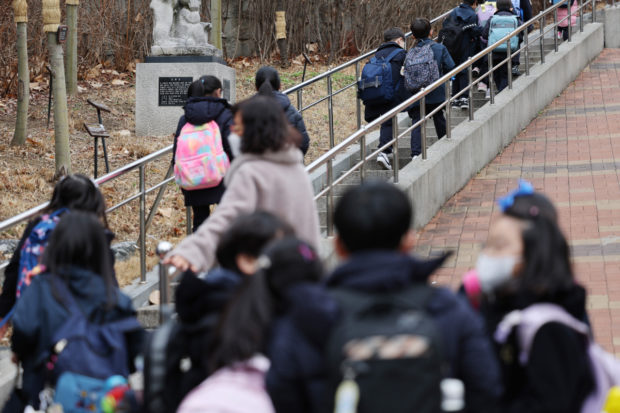
Students arrive at an elementary school in Seoul on Monday. (Yonhap via The Korea Herald/Asia News Network)
SEOUL — South Korea reported more than 300,000 new COVID-19 cases for a third consecutive day Monday as the virus wave, fueled by the highly contagious Omicron variant, continued to grip the nation.
The country added 309,790 new COVID-19 infections, the majority of which coming from local transmissions, putting the total caseload at 6,866,222, the Korea Disease Control and Prevention Agency (KDCA) said.
Monday’s count is a drop from the previous day’s 350,190, due largely to fewer tests on the weekend. South Korea logged an all-time high of 383,664 on Saturday, after reporting more than 300,000 virus cases for the first time last Wednesday.
The death toll from COVID-19 came to 10,595, up 200 from Sunday, with the fatality rate standing at 0.15 percent.
The number of critically ill patients hit a record high of 1,158, up 84 from the previous day.
South Korea has seen the infection cases spike exponentially since the beginning of this year, with the daily figures soaring from four digits to five digits in late January. It took 13 days to jump from 100,000 to 200,000 and eight days to top 300,000.
In a step to rein in the virus surge, the government announced the inoculation program for children aged between five and 11 will start later this month.
The decision, despite worries about side effects, was made in consideration that those aged under 11 account for more than 15 percent of all COVID-19 patients, Interior Minister Jeon Hae-cheol said in a briefing on virus response.
He added the vaccines have proven to be “safe and effective” in other countries that introduced the vaccination program ahead of South Korea.
The government projects the Omicron wave to enter its peak stage this week. The daily average of infected patients soared from 190,000 in the first week of March to 280,000 last week.
Health authorities have shifted the focus to treating serious cases and preventing deaths, ending its rigorous contact tracing program seen as a successful containment strategy in the early days of the pandemic.
Starting this week, uninfected students and school staff can attend school in person even if family members who live with them are virus positive.
Of the locally transmitted cases reported Monday, 56,807 cases came from Seoul and 77,420 from the surrounding Gyeonggi Province. The western port city of Incheon reported 18,238 cases. Cases from overseas rose 62 to 30,302.
Of the 52 million population, 32.1 million people, or 62.6 percent, had received booster shots as of Monday. The number of fully vaccinated people came to 44.43 million, representing 86.6 percent. (Yonhap)
RELATED STORIES